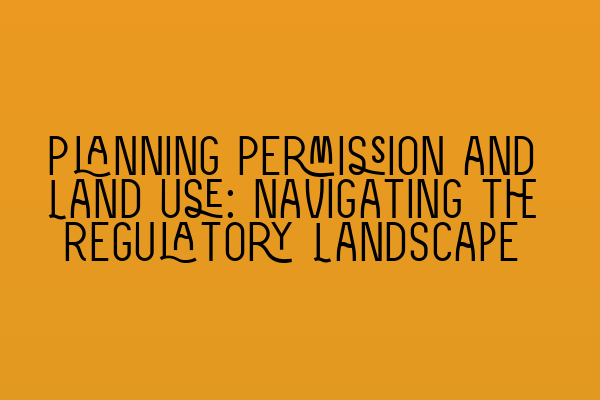Planning Permission and Land Use: Navigating the Regulatory Landscape
When it comes to property development and land use, navigating the regulatory landscape can be complex and challenging. Understanding the planning permission process is essential for property owners, developers, and anyone involved in property transactions.
Planning permission is the legal approval required for certain types of development, such as building new structures, changing the use of land or buildings, or making significant alterations to existing structures. It is obtained from the local planning authority, which usually consists of the local council or municipality.
The regulatory framework surrounding planning permission is designed to ensure that development is carried out in a sustainable and controlled manner, taking into account factors such as environmental impact, infrastructure requirements, and the needs of the local community.
The Planning Permission Process
The planning permission process typically involves several steps:
- Pre-application: Before submitting a formal planning application, it is advisable to engage with the local planning authority to discuss the proposed development. This allows for early feedback and can help identify any potential issues or constraints.
- Formal application: Once the plans and documentation are complete, a formal planning application is submitted. This includes detailed drawings, architectural plans, environmental impact assessments, and any other relevant information. The application fee is typically based on the scale of the development.
- Validation: The local planning authority verifies that all necessary documentation and information have been submitted. This includes checking for compliance with local planning policies and regulations.
- Consultation: The application is made available for public consultation, allowing interested parties and stakeholders to provide feedback and raise any concerns. This may include neighbors, community groups, and organizations with an interest in the area.
- Assessment: The local planning authority assesses the application, considering factors such as the impact on the surrounding area, compliance with local planning policies, and the needs of the local community. This process may involve site visits and consultations with other relevant authorities, such as highways or environmental departments.
- Decision: The local planning authority makes a decision based on the assessment. This could be approval, refusal, or approval with conditions. The decision is communicated to the applicant in writing, along with any reasons for refusal or conditions attached to the approval.
The Importance of Compliance
Compliance with planning permission regulations is crucial to avoid legal issues and financial penalties. Failure to comply can result in enforcement action, which may include stopping the development, demolishing unauthorized structures, or hefty fines.
As a property owner or developer, it is important to work closely with a qualified solicitor who specializes in property law and land law. They can guide you through the planning permission process, ensuring compliance with all relevant regulations and policies.
At SQE Property Law & Land Law, our team of experienced solicitors can provide expert advice and assistance in obtaining planning permission, dealing with planning appeals, and navigating the complex regulatory landscape. Our knowledge and expertise can help you achieve your property development goals while minimizing legal risks.
Conclusion
Navigating the regulatory landscape of planning permission and land use requires a deep understanding of the legal processes and regulations involved. Working with a qualified solicitor who specializes in property law and land law can provide the guidance and expertise needed to ensure compliance and avoid potential legal pitfalls.
For more information on planning permission and property law, we recommend checking out our related articles:
- SQE 1 Practice Exam Questions
- SQE 1 Practice Mocks FLK1 FLK2
- SQE 2 Preparation Courses
- SQE 1 Preparation Courses
- SRA SQE Exam Dates
If you have any questions or need assistance with planning permission and land use matters, please don’t hesitate to contact us. Our dedicated team of solicitors is here to help.
